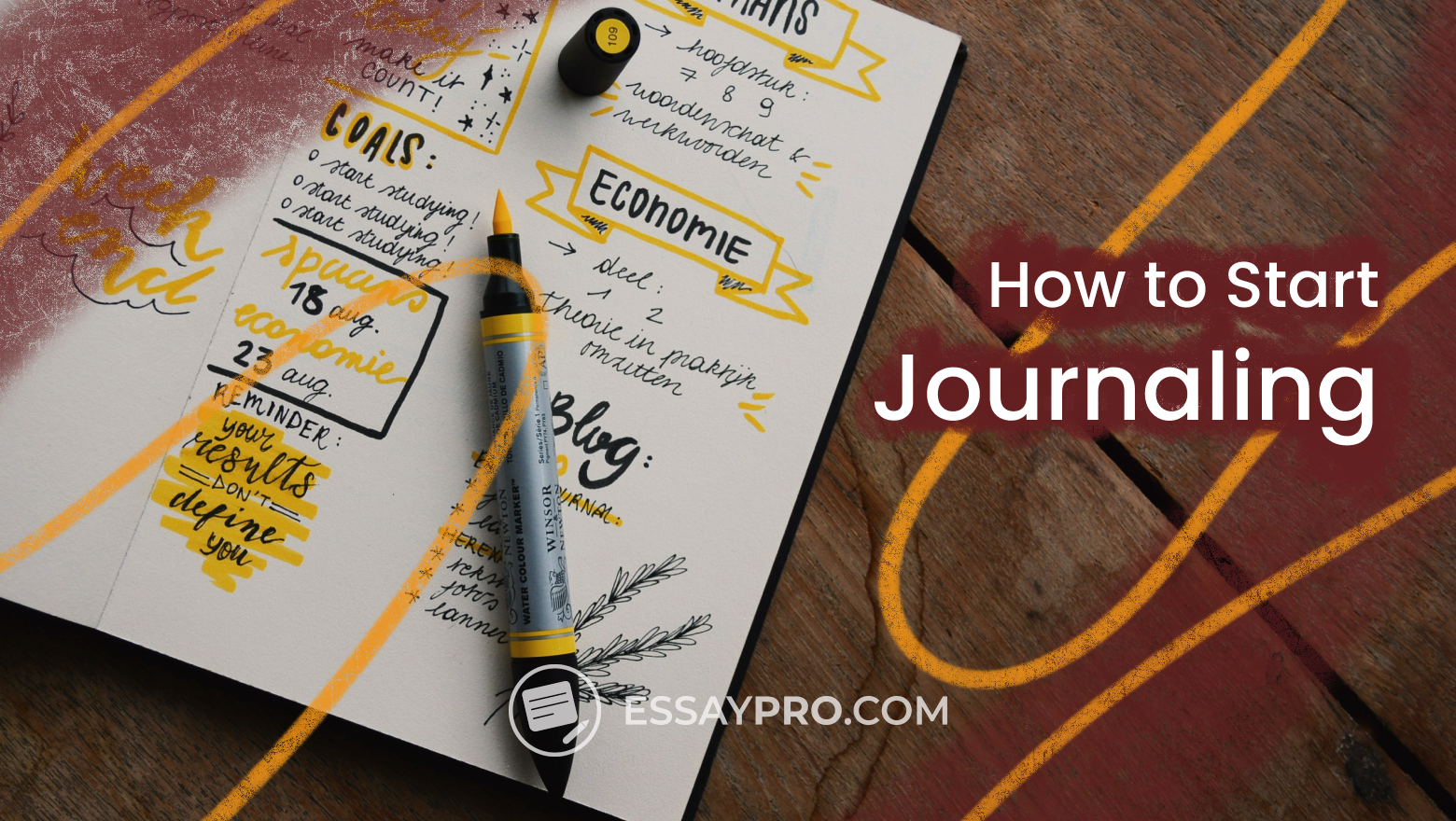Journaling has a way of making thoughts visible. It helps untangle feelings, notice small shifts, and hold onto moments that might otherwise disappear. Every entry holds value, even when the words feel incomplete.
- Figure out why you want to journal
- Pick a notebook that feels right
- Start small and simple
- Try prompts or templates if you’re stuck
- Let the words flow without judgement
- Be patient with yourself
This guide is about journaling for beginners. Academic writing, on the other hand, requires a little more than a pretty notebook and good intentions. It asks for a whole different kind of focus and organization. If formal writing doesn’t come easily to you, EssayPro can help you transform raw thought to structured expression.
What is Journaling?
Journaling is the habit of writing down thoughts, experiences, and reflections as they come. A journal entry might be a list, memory, question, goal, or something half-formed, each capturing the moment of awareness or feeling. The purpose varies between writers, but the act itself helps with focus and self-confidence.


Types of Journaling to Try
There are plenty of ways to keep a journal, and none of them need to follow a perfect system. As you hear expert insights from Melanie Weir, you’ll notice that journaling is more about consistency and self-expression than format. Some people write to reflect, others just want to remember what they did. Some like structure, some prefer chaos. Journaling can be a list, a sketch, a sentence, or a voice memo.
Reflective Journaling
This kind of journaling helps you slow down and process your reactions and emotions. It gives you space to notice what’s really going on beneath the surface: what you’re feeling and how you’re responding to what’s happening in your life.
Daily Logs
These are short summaries of your day. You simply write down what happened and how it felt, even when the day was ordinary. Daily logs help you notice patterns so you can see what feelings are often resurfacing.
Bullet Journaling
This method can turn scattered thoughts into something easy to follow. Bullet journaling is part planning, part reflection. Each page becomes a small system that helps you hold your life together.
Gratitude Journaling
A simple list of things that felt good. Some days, you’re thankful for something huge. Others, you’re just grateful you could enjoy a nice breakfast and a cup of coffee. Gratitude journaling helps you pay attention to what’s comforting in your day-to-day life.
Digital Journaling
Journaling doesn’t require a pen and paper. It can happen in your notes app or even a late-night email to yourself. The point of digital journaling is that it can be with you anytime, anywhere.
Art or Visual Journaling
Not everything can be expressed in words. Some people simply struggle to verbalize their feelings and prefer to think in images. Visual journaling allows you to let your thoughts take shape through images and textures.
Why Start Journaling?
There are a hundred reasons people give, but most of them miss the real feeling. Journaling practice is about having one space where nothing needs to be filtered, where things can be messy and still make sense later.
- Helps make scattered thoughts feel less loud
- Gives emotions somewhere to land
- Builds self-trust over time
- Makes it easier to notice patterns you usually ignore
- Becomes a record of days you might forget
- Clears your head without needing a solution
- Turns big feelings into something smaller and more manageable
- Lets you tell the truth without worrying how it sounds
How to Start Journaling?
A journaling journey does not begin with a perfect setup. It often starts on a day that feels too crowded or in a moment that passes too quickly. You pick up a pen, not to write something impressive, but to let something out. There are no rules and no one is watching. You write because it helps you hear your own thoughts more. The section below covers the entire process of journaling step by step, so you know exactly how to approach it.
1. Ask Yourself Why You Want to Keep a Journal
Every habit needs a reason to stay. Journaling is no different. Before filling a page, take a moment to understand what you hope to get from it. The reason does not need to sound meaningful. It only needs to feel true. Do you:
- Want to clear mental clutter?
- Need a space where nothing must be filtered?
- Feel overwhelmed and want a place to sort it out?
- Hope to notice patterns in emotions, habits, or reactions?
- Want to remember the small details that usually fade?
2. Choose a Journal You Truly Enjoy Using
The journal itself sets the tone. Some feel too polished, like they are waiting for perfect sentences. Others feel soft, lived-in, and easy to open. That difference will shape how often you reach for it. It must be something you want to return to.
- Prefer a small notebook that feels light and easy to carry
- Choose wide pages if you tend to sprawl when writing
- Look for paper that feels right under your pen or pencil
- Decide between lined, unlined, or dotted based on how you write
- Pick a cover that matches your pace, your colors, and your mood
The journal becomes part of the ritual. If it feels too rigid, the habit may start to feel like work. If it feels open and quiet, it becomes a space you trust.
3. Find Your Space
TikTok has probably sold you the idea of ‘journal aesthetics’. We’re here to tell you not to do any of that. Do not romanticize it and do not think about candles, soft music, and perfect lighting. What we mean by ‘your space’ is a place where you are less likely to lie to yourself. That might be a kitchen chair at 2 am or a bedroom floor because you cannot commit to furniture.
- Avoid any space where you feel observed, even by yourself (e.g., mirrors)
- Let background noise in if it keeps the silence from getting too loud
- Use whatever surface is closest: countertop, backpack, or your knee
- Put the journal somewhere inconvenient so you won’t forget it exists
4. Begin With Short Journal Entries
Overshooting the first entry is the fastest way to never write a second one. Avoid the pressure to capture everything or say something meaningful. Write a sentence that sounds unfinished, a detail that feels too ordinary, a thought that repeats itself. Let it be short, strange, boring even.
- Write the first thing that crosses your mind
- Describe what you saw, ate, avoided, or forgot
- List whatever feels stuck in your head without explaining it
- Repeat a thought until it loses its grip on you
This is a chain reaction: small entries grow into habits. Habits grow into clarity. So, right now, small is enough.
5. Try Using Journal Prompts
There will be days when nothing comes naturally, and that is normal. This is where journal prompts help. They give you a starting point that feels concrete.
- Answer a question you would never ask out loud
- Describe a moment from yesterday without using emotion words
- Finish a sentence like 'Right now, I feel…' or 'I keep thinking about…'
- React to a quote, a memory, or something you overheard
- Invent a question, then answer it badly on purpose
Prompts will get you moving. A strange one might take you somewhere useful, while an obvious one might surprise you. The goal is to begin and keep going long enough to notice what shows up.
If you enjoy reflecting on personal moments, you might also find inspiration in narrative essay topics.
6. Try Different Ways to Journal
If every page starts to sound the same, stop writing what you think a journal is supposed to look like. Forget about consistency. That’s not your main objective. You need to contact what exists in your head at the given moment. Some days, a paragraph feels right. Other days, you may need to diagram your guilt.
- Write a complaint so petty you would never say it out loud
- Make a timeline of every moment you almost changed your life but chose not to
- Track the lies you tell politely every day and what they cost
- Invent an entry in the second person, as if you are talking to someone else
- Make a list titled ‘things I am pretending not to want’
If one method fails, switch immediately. The page is your testing ground.
You may want to explore how to shape your entries further. This article on how to write an autobiography can give that personal writing more depth and direction.
7. Try Writing With Journal Templates
Structure won’t ruin honesty. Templates will hold you steady when your mind is scattered into pieces.
- Start with a template that asks the same three questions each day
- Use sections like 'what happened,' 'how I felt,' and 'what I noticed'
- Fill in a mood tracker, energy scale, or one-sentence summary
- Try morning pages, gratitude lists, or evening reflections
Templates are your friends. If you feel stuck, let the structure carry you for a while until you’re back on your feet again.
8. Write Like Nobody’s Watching
Write what you would never say in a room full of people, or like someone dared you to be unhinged for five minutes. Forget about clarity, grammar, and making sense, because this time, you’re not writing an essay.
- Go full-on Virginia-Woolf-Stream-of-Consciousness
- Say the uncomfortable thing first and explain it never
- Write in half-sentences, emojis, drawings, gibberish, whatever works
- Start with something real and let it turn ridiculous halfway through
Free writing is where the truth gets weird and the weird gets useful. If you cringe at what you wrote, that means something broke open. If you feel tempted to shape it into something spoken, this guide on how to write a speech about yourself might give it new life.
9. Pay Attention While You Write
Remember how journaling is nothing like creating an essay? It also has nothing to do with a speed contest. So, slow all the way down and live fully inside the moment. Some people like to call this mindfulness.
- Feel your hand move, and let that be part of the entry
- Notice when a word feels sharp, soft, heavy, or wrong
- Track how your body shifts when you write something honest
- Write about what the light looks like right now
- Name what is real in this exact second without fixing it
If you want to take it further and give your thoughts more structure, this guide on how to write a reflection paper shows how to do that without sacrificing honesty.
10. Give Yourself a Break
You will skip days, and you will write things that feel hollow, pointless, or cringe. You might also stop mid-sentence and not return for a week. But you’re not doing all these to make progress charts and learn perfect habits.
- Write something useless and let it stay
- Leave a page empty without guilt
- Start again without making it dramatic
- Reread old entries without judging who you were
- Let the process be strange and still worth it
Being kind to yourself is part of a discipline, only well-disguised.
When Journaling Feels Hard
Even with good intentions, journaling can get weird, heavy, or just plain annoying. It means something needs adjusting. These journaling tips are here for the moments when your habit stalls, slips, or stops making sense.
When You Keep Forgetting to Journal
Forgetting probably means the habit isn’t part of your day yet. What you can do is pair journaling with something that already happens, like right after brushing your teeth, during your morning coffee, or before closing your laptop. Keep your journal visible and put a sticky note where your brain will trip over it. These time management tips can help carve out small windows in your day where journaling can find space to live.
When Journaling Feels Like a Chore
If journaling starts to feel like homework, it has probably lost its connection to your actual life. Stop forcing deep reflections or structured entries. Write a list, scribble a complaint, document the weird thing you saw on the train. Break the routine on purpose. Sometimes, doing it badly on purpose is what brings the joy back.
When You Feel Zero Motivation to Write
Lack of motivation often hides behind pressure. You think you need to write something meaningful, so you do nothing instead. Let that go. Open your journal and write whatever is closest to the surface. Even ‘I do not want to do this’ counts. Start anywhere, with low expectations. The habit matters more than the result.
When You Worry Someone Might Read It
If privacy feels fragile, change the way you write. Use code words, write in fragments, and tear out pages if it helps. Lock your journal in a drawer or use a password-protected app. You deserve a space where you can be your true self. The goal here is freedom, so protect it however you need to.
When the Process Feels Pointless
Not every entry will feel profound. Some will feel flat, boring, or disconnected, and that is part of it. You are building a practice, not performing. Keep going anyway. Write badly, loosely, like nobody will care, including you. The value often shows up later, when you least expect it.
Final Notes
Journaling can feel awkward at first, like talking out loud in an empty room. But once you begin, the page becomes familiar.
If you begin turning your journal into something more formal, like essays, speeches, or personal reflections, it helps to make sure the writing is fully original. Use EssayPro’s tool and make sure your personal work stays as personal as it should be.
Check Your Work Before You Share It
Make sure everything you write is fully yours. Use EssayPro’s plagiarism checker.
FAQ
How to Begin Journaling?
Start by choosing a simple space to write and a reason that feels true. Keep your first entry short and familiar. Do not wait for inspiration; just write something that reflects where you are.
What Should I Write When I Start Journaling?
Write what is already on your mind. That could be a sentence about your morning, a strange thought that will not leave, or a list of things you are trying to ignore. The first entry only needs to exist.
How to Finally Start Journaling?
Drop the idea of doing it perfectly. Make it easy to reach for your journal. Pair it with something you already do. Let the first page be messy, incomplete, and honest. That is the beginning.

Daniel Parker
is a seasoned educational writer focusing on scholarship guidance, research papers, and various forms of academic essays including reflective and narrative essays. His expertise also extends to detailed case studies. A scholar with a background in English Literature and Education, Daniel’s work on EssayPro blog aims to support students in achieving academic excellence and securing scholarships. His hobbies include reading classic literature and participating in academic forums.
- University of St. Augustine for Health Sciences. (2023, July 20). 7 ways journaling benefits students. https://www.usa.edu/blog/ways-journaling-benefits-students/
- Raypole, C. (2023, February 14). The mental health benefits of journaling. Healthline. https://www.healthline.com/health/benefits-of-journaling







